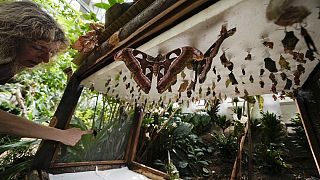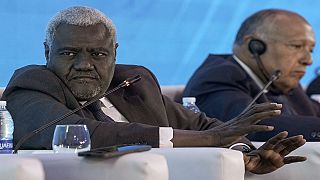Ghana
The ongoing energy crisis in Ghana does not seem to have dumpened the hopes and aspirations of many enterprising Ghanaians.
A group of students and lecturers at the Kumasi Polytechnic in Ghana’s second main city, are resorting to electricity to solve some of the challenges in the automobile industry.
Ghana imports an estimated 70,000 vehicles annually. These vehicles are powered either by petrol or diesel. Some of them are also old meaning there’s the challenge of air pollution from exhaust fumes.
To this end, the Kumasi polytechnic has taken up the task of finding an alternative source of fuel for cars – electricity.
Their technology however does not necessarily require the building of a new car as the technical head of the project explains.
“Like what we have developed, if you’re having an already existing vehicle, all that we do is we only change a section of the engine and then we fix the electrical component in for you to use it without buying fuel,” said Samuel Ampiah, the Technical Head of the Kumasi Poly Electric Vehicle project.
Settling on this new technology required some extra work in the field as it was the best way to ensure the success of the project.
Mamadu Hamidu who led the research said they had to check the effect a possible shift to electricity would have on cars that currently run on fossil fuels.
“So we decided to contact certain vehicle transport yards that make maintenance so we also assessed their environment and talk to them about certain kind of materials they use that help them in fabrication processes. So based on these approaches, we were able to come up with a very good idea to suit our technology.”
The polytechnic has since gone ahead to build its own electric powered vehicle. Within five months, the vehicle was 90 percent complete.
This feat was achieved in spite of misgiving expressed by some Chinese firms as was explained by the Polytechnic’s rector.
“There was a professor in mechanical engineering who said that really if you are able to do this type o car you are talking about, then that would a revolution in electric car assembly because it has never been done anywhere” Prof. Nicholas Nsowah-Nuamah said.
“I went to China in March, they said it is not true that we can do that type of car because China for many years has been struggling to do it, (and) it has never been successful. But Kumasi polytechnic has been able to do it” he added.
The wholly made Ghanaian electric car is expected to be ready by August this year.
But will the school venture into commercial production of its electric car?
“The Chinese who were doubting our capability pledged to come into partnership with us if we are successful, so that is how we want to go about it. Not K-poly itself trying to look for many and go into full production, but to partner with industry” Prof. Nsowah-Nuamah said.
Samuel Ampiah however anticipates a key challenge their product might face will be how the Ghanaian society which has become accustomed to foreign goods will accept an electric vehicle manufactured locally.
The Kumasi Polytechnic is the not the only entity venturing into the local manufacture of vehicles.
Apostle Kwadwo Sarfo, founder of the Christo Asafo Church recently outdoored his first range of locally manufactured 4-wheel drive cars – the public’s reception to his vehicles has been mixed.














Go to video
Kenya offers free E-Visa to Ghanaian travelers
01:02
Pics of the day: June 3, 2024
01:07
Ghana signs MoU to restructure $5.4 billion debt
02:20
One-year-old Ghanaian breaks Guinness World Record, inspires call for early talent nurturing
01:35
Mobile networks attracting more smartphone users as Ghana tries to close digital gap
01:49
Morocco’s automotive industry shifts gears to prep for EV era